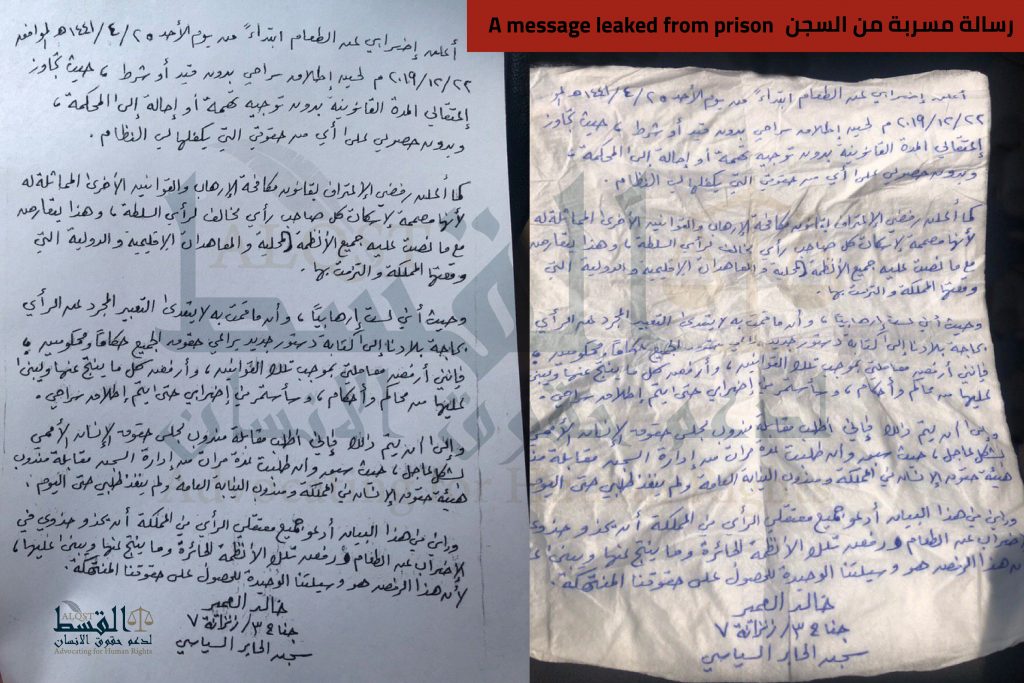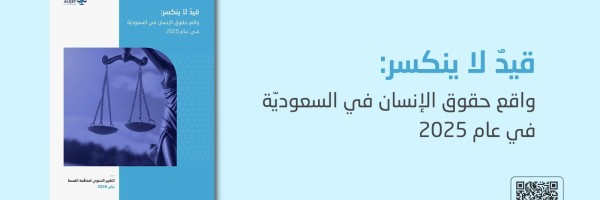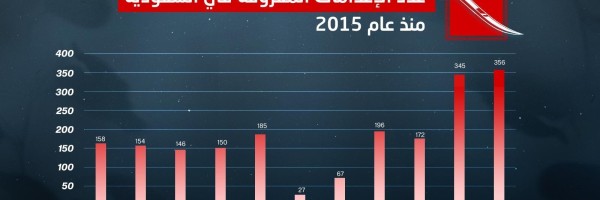ALQST has received from its sources inside Saudi prisons a written message from prisoner of conscience Khaled bin Suleiman al-Omair, who has been detained since the end of June 2018. Khaled al-Omair smuggled out a message that he wrote on a piece of tissue, in which he expressed his protest against his detention without charge. He also requested an urgent visit from the envoy of the UN Human Rights Council, and called on all prisoners of conscience to join the hunger strike, as there is no mechanism that allows for them to obtain their rights and freedom.

The full message reads: "I hereby declare that I am going on hunger strike from Sunday, 22 December 2019 until such time as I am released unconditionally and without restriction, since I have been detained for longer than the legal period without charge and without being brought to court, and without having obtained any of my rights that I am guaranteed under the law.
I also declare that I refuse to recognise the Counterterrorism Law and other, similar laws because they are designed to silence anyone with an opinion that differs from the government’s opinion, contrary to the provisions of all domestic laws and regional and international treaties that the kingdom has signed and is bound by. And since I am not a terrorist, and have done nothing more than simply express the opinion that our country needs a new constitution to be written that has regard for the rights of everyone, rulers and ruled, I refuse to be dealt with under those laws, I reject all the courts and sentences arising from and based upon them, and I will continue my strike until I am released.
Until that happens, I urgently request an interview with the envoy of the UN Human Rights Council, since I have asked the prison administration several times previously for an interview with the representative of the Human Rights Commission in the kingdom and the representative of the Public Prosecution and my request has not been fulfilled to date.
In this statement I am calling on all prisoners of conscience in the kingdom to follow my example in going on hunger strike and rejecting those despotic laws and the things that arise from and are based on them, because this rejection is our only way of obtaining our violated rights."
Khaled al-Omair Wing 3, Cell 7 Al-Ha’ir Political Prison
This is not the first time that al-Omair has been imprisoned arbitrarily and undertaken a hunger strike.He began a hunger strike on 6 October 2016 in protest against his continuing detention despite the expiry of his eight-year prison sentence, remaining on hunger strike until an order was issued for his release. The authorities re-arrested him without charge after he filed a complaint against an officer who tortured him in prison.
ALQST also learned that prominent human rights activist Waleed Abu al-Khair began a hunger strike on 27 November, in protest against his transferal to a high security unit and being subjected to torture, which led to deterioration in his health. He ended his strike after 14 days, after the authorities returned him to his previous cell on 10 December.
On 11 December, the authorities again raided Waleed Abu al-Khair’s cell, as well as the blogger Raif Badawi, and transferred them both, hands and feet tied, to a high security unit. This led Abu al-Khair to return to hunger strike, along with Badawi, which continues until now.
The hunger strike of these three activists, al-Omair, Abu al-Khair and Badawi, comes at a time when the Saudi authorities are talking about their genuine intention to improve their human rights record as they prepare to host the Dakar Rally, the G20, and a women's golf tournament. However, such promises have not extended beyond political meetings and the media, and on the ground they have continued commiting grave violations, including arbitrary detention, torture, and the use of the death penalty.
ALQST points out that the authorities are still torturing a number of male and female activists in Saudi prisons, whether in torture cells outside official prisons, or inside the prisons themselves.
And the news of a number of prisoners of conscience is still unknown, especially Mohamed al-Bejadi, Yasser Al-Ayyaf and Ali Hamza Al Omari. There are reports that activist Essa al-Nukhaifi was transferred to the high security unit in al-Ha'ir prison in Riyadh and was subjected to severe torture along with others. The authorites are also still holding a number of less well-known male and female tweeters who are still in the same torture cells that the women’s rights activists were tortured in. In addition, a number of arrested activists are still being subjected to severe restrictions in prison, including by way of prolonged solitary confinement, as is the case with women activists Nassima al-Sadah and Loujain al-Hathloul.
Although the authorities pledged some time ago to investigate the brutal torture and sexual harassment undergone by several prisoners of conscience, such as Eman al-Nafjan, Abeer Namankani, Aziza al-Yousef, Loujain al-Hathloul, Samar Badawi, Nouf Abdulaziz al-Jeraiwy, Mayaa al-Zahrani, Shadan al-Onezi, Hatoon al-Fassi, Maysaa al-Manea, Ali Hamza Al Omari, Mohammed al-Bajadi, Yasser al-Ayyaf and Aida al-Ghamdi, they have not conducted any genuine investigations, and neither have they stopped the torture. Loujain al-Hathloul and Naseema al-Sadah are still in solitary confinement, and Nouf Abdulaziz al-Jeraiwy, Mayaa al-Zahrani and Samar Badawi are also still in prison. The whole case against them remains open, while even those who have been temporarily released pending trial are being prevented from continuing their work and studies. The authorities have not kept their promises made on many occasions to release them, close the case and compensate the women for damages; in fact they are continuing to violate their rights.
ALQST believes that the Saudi authorities are continuing to commit these violations, which affect everyone at all times, because of the silence of both the local and the global community, and because of the money the authorities are spending on PR, publicity and promoting the kingdom’s leadership. They are trying to cover up their abuses by holding high-profile sporting events and spectacles supported by businesspeople, politicians and sporting figures around the world, who are not taking account of the deteriorating state of human rights in Saudi Arabia and the grave dangers to society of this heavy repression.
ALQST would remind the Saudi authorities of their obligation to respect freedom of speech, their duty to desist from torture and arbitrary arrests, and their duty to release immediately and unconditionally all prisoners of conscience. At the same time, however, it maintains that everyone should step up to their responsibilities and refrain from playing any part in covering up these violations through politics, the media or sport. They should be prepared to uncover such abuses and boycott Saudi events, in order to create real pressure on the authorities to respect human rights and improve their human rights record.




